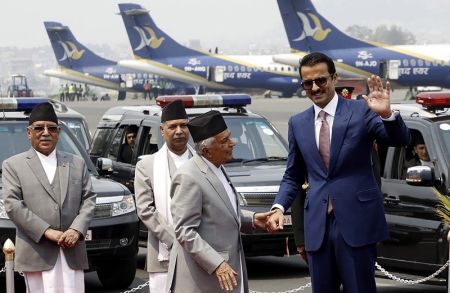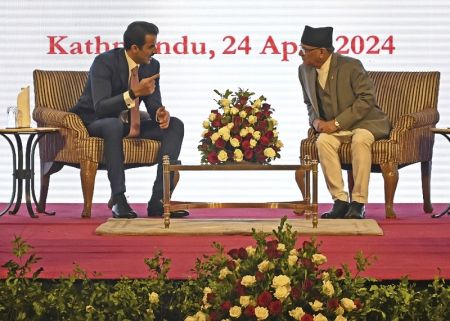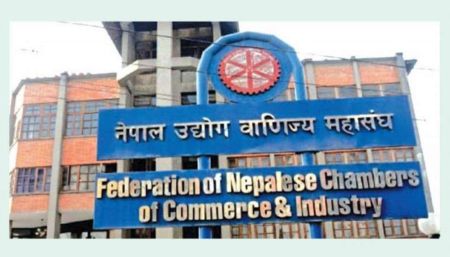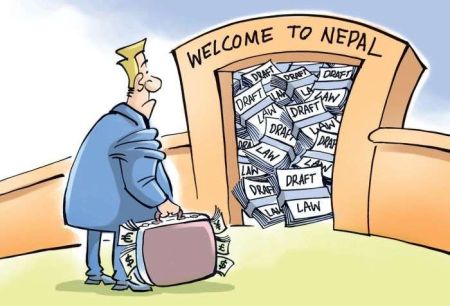.jpg) Eugene Kaspersky is the chairman and chief executive officer of Kaspersky Lab, the globally known manufacturer of cyber security solutions and anti-virus programs. He was recently in Nepal to unveil new Kaspersky products and attend the Kaspersky Dealers’ Meet. In an interview with Akhilesh Tripathi of New Business Age, Kaspersky spoke about the presence of his company’s products in the Nepali market, the emerging challenges in cyber security and other issues. Excerpts:
Eugene Kaspersky is the chairman and chief executive officer of Kaspersky Lab, the globally known manufacturer of cyber security solutions and anti-virus programs. He was recently in Nepal to unveil new Kaspersky products and attend the Kaspersky Dealers’ Meet. In an interview with Akhilesh Tripathi of New Business Age, Kaspersky spoke about the presence of his company’s products in the Nepali market, the emerging challenges in cyber security and other issues. Excerpts: What brings you to Nepal?
I like to visit countries. I am very sorry for being late to Nepal. Nepal is one of the most known countries. It’s famous for its Himalayas – Mt Everest. It’s also the birthplace of Buddha. I had been dreaming of visiting Nepal for a long time. From time to time, I climb mountains. The highest mountain that I have climbed is in Mexico. It’s 5,300 m tall. The last mountain that I climbed was Mt Fuji in Japan. This time I got an opportunity to visit Nepal. But unfortunately I am not here to climb mountains this time. Maybe next time! This time, I am here to meet our partners. We have our dealers’ meet here and we also launched our latest anti-virus program in Nepal. The visit has provided me an opportunity to know about the local market
How did you get into the field of cyber security?
I began my career in cyber security accidentally when my computer became infected with the ‘Cascade’ virus in 1989. My education in cryptography helped me analyze the encrypted virus, understand its behaviour, and develop a removal tool for it. After successfully removing the virus, my curiosity and passion for computer technology drove me to start analyzing more malicious programs and developing disinfection modules for them. This exotic collection of antivirus modules eventually became the foundation for Kaspersky Lab’s anti-virus database. Today, the database is one of the most comprehensive and complete collections in cyber security, protecting systems from more than 100 million malicious programs.
What are the new challenges in cyber security?
Today, we are facing a growing number of mobile threats. Mostly, Androids are being infected. The number of cyber criminals who target Android phones is growing very fast. It means that there will be more and more malware for Android systems. So, the first challenge is to educate people about mobile threats. Second challenge is to have effective disinfection systems. We are also facing not only cyber crimes but also traditional crimes in the cyber space. By traditional crime, I mean drug cartels and criminal mafia are employing software engineers to support traditional crimes. For example, drug cartels hack computer systems to support cocaine transportation. Recently, they cracked a sea port in Europe and managed to unload a container of cocaine at safer location. Thus, they passed the security-check area. It means the traditional crime mafia is climbing into cyber space. This also means we have to be ready for very unusual and unpredictable attacks. Another new challenge is that cyber criminals are attacking computers which manage power plants, power grids, financial services etc. This means we need products to protect critical infrastructure.
Could you briefly tell us about your latest products?
We have new products for consumers, new products for enterprises. We are also developing products for critical infrastructures. Once a year, we release consumer products. We are also developing multi-device protections. We launched our latest product for this year in April. Our latest product is an improved one in many aspects. We are providing special products for the security of online banking and transactions.
Globally, cyber attacks are getting worse and worse and new problems are emerging day by day. How does Kaspersky Lab plan to tackle this problem?
You are right. Cyber criminals are getting smart. They are creating new problems every year. But we are smarter; so we are coming up with disinfection solutions. In some cases, we have been able to predict the technologies that these bad guys are using. Our team is working all the time to improve and upgrade our products so that they can confront new challenges. We are providing security not only for computers and smart phones but also for smart TVs. It’s like a sport game where we and cyber criminals are playing against each other.
How strong is the Kaspersky database in protecting systems today?
We are the best. These are not just my words. It’s proved by the tests and it’s proved by the feedback from our customers. Most importantly, we have got very good references from cyber criminals. Cyber criminals – many of them – protect their systems using our products! They know what we are doing.
What are the threats you worry about most today for consumers?
Attacks on financial services, attacks on online banking, attacks on mobile banking etc. Such attacks are worse for consumers. For enterprises, espionage attacks are getting worse and worse. I also worry about app stores. There are two methods for infecting things like iPhones and iPads: vulnerabilities or fake software with backdoors. I’m afraid people will use the fake software. It’s a logical attack and we’ve seen it many times on Android. We don’t know whether it’s happening on the iPhone, but it’s logical. For Apple, all it would take is a game or a piece of software that’s interesting to people, someone inserts through a backdoor, and it’s only activated on that particular device. If I’m thinking about this scenario, other people are too. For Android devices, you don’t need to plant malware on official sites because it’s more wide open and there are other sites to get apps. Now with Windows 8, there’s an app store as well. But there’s probably no need to attack this as the malicious links to malware sites always work, too.
What do you suggest to consumers to avoid cyber attacks?
There are two very simple things. The first is very simple, the second is more complicated. The simple thing is to use better security systems – for both computers and mobiles. The second thing which is more complicated is keep your mind switched on; don’t trust everyone on the Internet. There are too many bad guys out there. So, don’t click on every link that appears on your email. If you have emails with attachments from people you don’t know or find suspicious, don’t click on it.
How is the Nepali market for your products?
We started selling Kaspersky anti-virus program in Nepal in 2008 when our association with Sagar Group of Companies started. Since then, we have seen a steady growth of the Kaspersky solution in Nepal. Our products which are in the market are the number one products as far as the market share is considered. The Nepali market is still very small. So, we haven’t carried out any market study but whenever we talk to our channel partners and customers, we come to know that majority of the customers use Kaspersky products compared to other solutions. Nepal is a good market for us in terms of competition and given the size of the market itself.





















